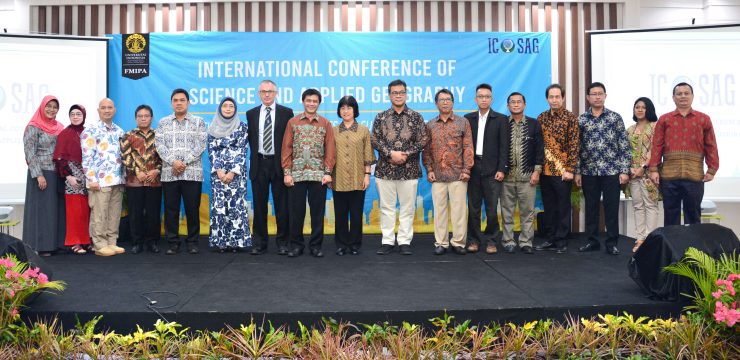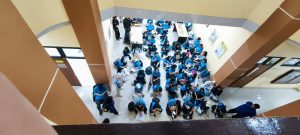The Department of Geography, Faculty of Mathematics and Natural Sciences, University of Indonesia (FMIPA UI) held an International Conference in the field of Applied Science and Geography entitled the International Conference of Science and Applied Geography (ICoSAG) on Saturday (24/8) at the Sinarmas Hall, Multidisciplinary Research Laboratory Building, FMIPA UI – PT. Pertamina, UI Depok Campus.
Carrying the main theme of “Improving the Quality of Human Resources and the Environment for Sustainable Development”, the Conference accommodates studies in the fields of geography and the application of science.
Not only attended by researchers from Indonesia, this activity was also attended by researchers from Japan, Malaysia, and England.
This conference brought four main themes to be discussed, namely spatial model applications, applied geography, human geography and regional development, and geographic education.
Spatial modeling applications focus on disaster risk reduction and spatial planning modeling for agriculture, farming, coastal areas and remote islands.
Meanwhile, applied geography focuses on hydrology and water resources, meteorology and climatology, and dynamic landscapes. "Climate change is affecting changes in river patterns," said Trevor Hoey from the University of Glasgow.
Drought symptoms and erratic rainfall patterns reduce the water table capacity of rivers, lakes and streams, causing slightly polluted water. Higher temperatures can reduce oxygen levels, which can kill fish and significantly damage ecosystems.
According to Trevor, the history of river patterns in the past can help researchers observe changes in river shapes from year to year. Thanks to increasingly sophisticated technological systems, research is getting easier to do for sustainable life.
However, he also hopes that in the future there will be a solution for a faster research process so that mitigation efforts can be carried out early.
Meanwhile, human geography and regional development focus on the development of social capital, empowerment of cultural identities and communities, economic and social transformation and regional development.
Then, geography education talks about the study of geography. "Landscape is always a problem, like poverty and also land issues," said Jatna Supritna, Head of the Research Center for Climate Change, University of Indonesia.
According to him, there must be a balance between production and long-term protection in order to maintain the stability of natural biodiversity, so that there is prosperity in the agricultural sector for humans and other living things in the forest.
Animals and plants play a big role in forest regeneration. If there are no animals in the forest, there will be a shortage of carbon dioxide needed by plants for photosynthesis, and if plants cannot photosynthesize, they will die, thus reducing the oxygen supply.
Scientific studies are essential in the process of developing research that can be used as a planning system and utilization of the earth's geographical features.
The dynamics of the use of natural resources and human resources tend not to pay attention to the capabilities of the ecosystem which can have an impact on reducing the carrying capacity, resilience and sustainability of development.
News source: https://sci.ui.ac.id/




